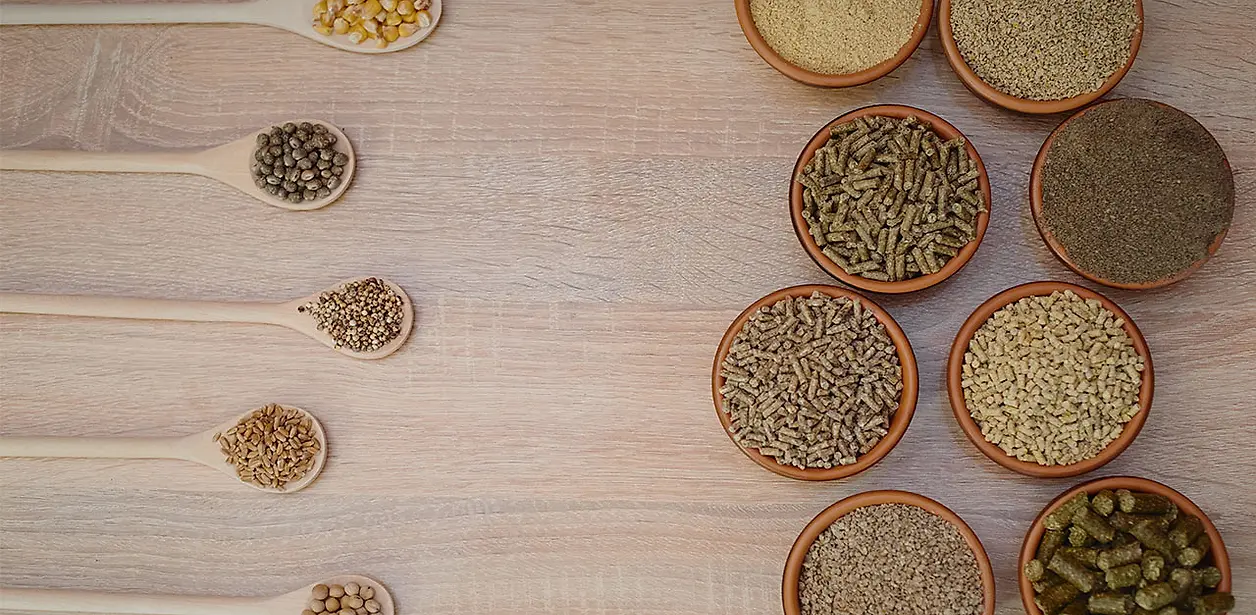ISO 139102 Moisture Profiling in Sunflower Meal Feed
The ISO 139102 standard provides a robust methodology for moisture profiling of sunflower meal feed, which is crucial for ensuring the nutritional quality and stability of this important agricultural product. This service ensures that the moisture content across different portions of the feed is accurately measured, thereby preventing spoilage and maintaining consistent nutritional value.
Sunflower meal is widely used in animal feeds due to its high protein content and energy. However, improper moisture management can lead to mold growth, reduced palatability, and decreased digestibility, all of which can negatively impact livestock health and productivity. By adhering to the ISO 139102 standard, we ensure that the moisture content is optimized for storage and use.
The process involves precise sampling of the feed material from various locations within a batch or shipment. The samples are then dried at controlled temperatures and pressures before being reweighed to determine the moisture loss. This method provides a detailed profile of how moisture is distributed throughout the sample, allowing for identification of any areas with excessive moisture that might lead to spoilage.
Our state-of-the-art laboratory equipment ensures accurate results every time. The precision balance and drying oven are calibrated regularly to meet ISO standards, ensuring reliable data collection. This process not only meets but often exceeds industry expectations by providing a comprehensive view of the feed’s moisture content.
The significance of this service extends beyond mere compliance with regulations; it plays a critical role in maintaining product integrity and reliability. For quality managers, this means peace of mind knowing that their supplies are consistently reliable. Compliance officers can rest assured that they are adhering to international standards. R&D engineers benefit from having accurate data for developing new formulations or improving existing ones.
For procurement teams, understanding the moisture profile helps in negotiating better deals with suppliers who meet stringent quality criteria. Ultimately, this service contributes significantly to overall operational efficiency and sustainability by minimizing waste and maximizing resource utilization.
Applied Standards
The ISO 139102 standard is specifically designed for moisture profiling in sunflower meal feed, providing a standardized approach that ensures consistency across different laboratories worldwide. It specifies the procedure for determining the initial moisture content and subsequent changes due to drying or other processing methods.
This international standard emphasizes the importance of accurate sampling techniques to ensure representative results. Proper sampling involves taking multiple subsamples from various parts of the batch, mixing them thoroughly, and then selecting a composite sample for analysis. This ensures that any variability within the batch is accounted for, leading to more reliable conclusions about the moisture content.
Once sampled correctly, the feed material undergoes drying under specified conditions—typically at 105°C until constant weight is achieved. The dried samples are then reweighed to calculate the percentage of moisture lost during drying. This approach allows for precise determination of both initial and final moisture contents, providing a full picture of the feed’s state.
By following these stringent guidelines outlined in ISO 139102, we guarantee that our results are accurate, reproducible, and comparable with those obtained by other laboratories adhering to the same standard. This commitment to quality is further reinforced through ongoing training for our staff on best practices related to sample preparation and analysis.
Quality and Reliability Assurance
The reliability of ISO 139102 moisture profiling in sunflower meal feed lies in its adherence to internationally recognized standards. These standards provide a framework for consistent methodologies, ensuring that results are accurate, repeatable, and comparable across different laboratories.
Our laboratory employs rigorous quality control measures at every stage of the testing process. From initial sampling techniques to final data interpretation, each step is meticulously documented and reviewed to ensure compliance with ISO 139102 requirements. This includes regular calibration of equipment using certified reference materials as well as participation in proficiency testing programs organized by recognized bodies such as AALTC (Association for Analysis and Laboratory Testing Coordination).
In addition to internal audits conducted periodically, external auditors visit our facility annually to verify adherence to these standards. Their feedback helps us continuously improve our processes and maintain high levels of accuracy and precision.
Customer satisfaction is paramount in our operations. To achieve this, we strive not only to meet but exceed expectations by offering timely delivery of results along with detailed reports that provide insights beyond just numerical values. Our goal is to equip customers with the knowledge they need to make informed decisions regarding their supply chain management and product development.
Customer Impact and Satisfaction
The impact of ISO 139102 moisture profiling in sunflower meal feed extends far beyond mere compliance; it directly influences customer satisfaction through improved product quality and reduced risks associated with poor quality inputs. For suppliers, this service ensures that they deliver consistent products meeting specified criteria, thus enhancing brand reputation.
Quality managers benefit from having access to reliable data which aids in making strategic decisions about inventory management and production schedules. Compliance officers gain confidence knowing that their operations comply with international standards, reducing potential legal risks and improving stakeholder relationships.
R&D engineers can leverage this information for developing innovative products or optimizing existing formulas based on real-world performance metrics rather than assumptions alone. Procurement teams find value in selecting suppliers who adhere to strict quality protocols like those outlined by ISO 139102, ensuring better deals and longer-term partnerships.
Ultimately, this service contributes to overall operational efficiency and sustainability by minimizing waste and maximizing resource utilization. Customers appreciate the peace of mind knowing that they are receiving high-quality products consistently produced under controlled conditions.





